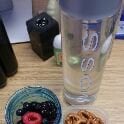Search the Community
Showing results for 'Yogurt'.
Found 17,501 results
-


Why are so many stages different?
RickM replied to ChunkyMonkeyGoneSlim's topic in Food and Nutrition
Much of the program protocols that we see in the WLS world are based upon RNY practices, as that has been the default procedure for the past couple of decades, and carried over to newer procedures such as the VSG as much for the convenience of the surgeons' staff as for an abundance of caution with a new or unfamiliar (to them) procedure. We see variations based upon the experience that different surgeons bring to the table from their varied backgrounds. For instance most of the DS programs that I have seen have a more rapid progression than we typically see in the majority of bypass oriented programs - I was on scrambled eggs and yogurt, along with liquids, in the hospital, and we progressed into most pureed and soft Proteins including most seafood as tolerated from there, with everything else added after the first month. Their general finding has been that patients seem to do better as the move to real food from supplements and shakes only. I'm not sure what a "lasagna roll up" is, but such a thing is conceivably tolerated at a couple weeks, particularly if it's primarily cheese and sauce. Given what I have seen from the DS world, it seems like the sleeve is somewhat more robust than most bypass oriented surgeons give it credit for, and many are slowly recognizing this as programs are slowly moving to more rapid progressions. Things like saltine crackers and mashed potatoes (particularly laced with Protein powder), while not necessarily ideal weight loss foods, are easily digested early on and can have a place in the progression as one moves toward more nutritionally dense foods for the longer term. Looking at how these procedures, and similar non-WLS gastric procedures are structured, it seems that the common thread is what type of tissues are being grafted together and how quickly those connections heal. The VSG is only stomach tissue connected to other stomach tissue (same with the DS, which is a sleeve plus intestinal rerouting, which adds intestine to intestine connections). Contrast with the bypass, which connects stomach tissue in the pouch directly to intestinal tissue - that's a tougher healing process (and indeed is the root of the bypass's much greater NSAID sensitivity relative to the VSG/DS) Looking at non-WLS gastric procedures, there are some straighforward partial gastric resections to remove ulcerated or other diseased areas, but are confined to just the stomach tissues (sort of a "partial" VSG), while there are some partial gastrectomies that remove the lower part of the stomach and leave a pouch that connects to an intestinal loop - the origins of the RNY gastric bypass. Getting more radical, a total gastrectomy typically removes the stomach end to end, connecting the esophagus directly with an intestinal loop (often with a pouch formed from intestinal tissue). This is an even "tougher" heal than the partial or bypass gastrectomies, and often uses a feeding tube for several weeks to maintain nutrition while allowing for the connection to heal. -


Don't feel full?
Daenerys Targaryen replied to reeniemay's topic in General Weight Loss Surgery Discussions
I had no problem when I started eating thicker things like scrambled eggs, yogurt, hummus, etc everything went down fine. My surgeon makes bigger pouches. She makes them 4oz at surgery instead of two, so maybe that's the reason for not ever feeling full or satisfied? I'm measuring an only eating 2-3 ounces just to be conservative. -
I think it has a lot to do with the fact that nutrition itself isn't an "exact" science. Every nutritionist has his or her own beliefs, based on practice and science together. I think that surgeons rely on their nutritionists to develop the pre-op and post-op diet plans. Some places have "standards" that they recommend patients stay within, while others tailor specific diets to each patient (not likely for busy surgeons). These standards can be deviated from, especially if something may not work for you or if you have specific allergies or needs. For instance, my nutritionist has a plan that every patient gets before the surgery. It explains the pre-op diet and post-op diet. Fortunately for me there was never any period that was 100% liquid. We were allowed some soft foods (foods that could easily slide through a funnel) as soon as we could tolerate it after surgery. The diet was full of typical recommendations....soups, yogurt, cottage cheese, scrambled eggs, etc. I mentioned to my nutritionist that I was interested in more of a "whole foods" based approach post-op and her eyes lit up and she provided me with a ton of information on how to accomplish that. It wasn't the normal plan that was handed out because eating a whole-foods based diet is often not the most "convenient" and certainly not the most budget-friendly, but it's what I wanted to do. I was set on taking this opportunity to completely retrain my tastes and focus on nutrient-dense foods and lean Protein sources. It's worked out well for me so far and really all it boils down to is staying away from processed foods. The key is to speak with your nutritionist about your specific wants/needs and then make that plan reality. I'm just glad I spoke with my NUT before surgery because I wouldn't have had the information or help that I have now if I didn't speak up. Best of luck!
-


Post op GSV pro-biotic consumption?
Bufflehead replied to casenior's topic in POST-Operation Weight Loss Surgery Q&A
I did a chewable probiotic for the first four weeks. After I was able to eat yogurt I discontinued the extra probiotic, but the chewable form was very easy to take and never gave me any problems. -


Explosive Bowel
missblonde20 replied to chicagorocks's topic in POST-Operation Weight Loss Surgery Q&A
I did and still do some mornings with the slider stuff like yogurt and cereal. I am 6 weeks out and the sensitivity has eased up - but I am sure once you start on more firmer foods, it will help. Eggs were quite 'rich' for me but are now totally OK. It just takes your tummy some getting used to. It's a hard process though and I had difficult days -


Bored with Breakfast! Any dieticians out there?
Clementine Sky replied to AmiLou's topic in General Weight Loss Surgery Discussions
Pinterest has heaps of low carb and VSG-related Breakfast recipes, so you might find some there that interest you. I love the blog site The World According to Eggface, which has a lot of delightful and simple recipes designed for people who've had WLS. On the weekends I'll whip up a batch of her little pancake bites for a treat. My staple breakfast has been a smoothie with a high-protein, low carb plain Greek yogurt like Fage, frozen kale (having it frozen helps with the consistency) and frozen low-GI fruit (that sufficiently mask the taste and color of the kale). As to the question of whether you can eat a protein bar and oatmeal for breakfast, I think only you can answer it. Protein bars and oatmeal vary by quality and nutrients, and the way each person responds to them differs. I've mainly designed my own diet but I did consult with a RD who recommended that I eat a modest amount of healthy carbs like oatmeal, vegetables, and fruit. She said that steel cut oats with healthy toppings rather than loaded down with sugar can be a good breakfast. In my experience, the drawback of it is that it's so filling it's difficult to get much protein in. My husband is a physician and urges everyone to have a quality form of protein within an hour of waking up. It doesn't have to be a huge amount, but it should be a serving. I rarely eat oatmeal, but I keep the Trader Joe's frozen oatmeal on hand for the rare days when it's really cold and I'm craving something warm in the morning. I'll add in some unflavored Protein powder, or some almond butter. The dietitian said everyone should avoid instant and flavored oatmeal because most are packed with sugar. I personally dislike most protein bars because they upset my tummy. Other people adore them. I would be sure to look for a protein bar that is lower in carbs. If you're really feeling deprived, you could simply have a protein bar and oatmeal and see how they impact your progress. If you continue to lose weight, carry on. If you stall out or gain, reevaluate. See whether you can still incorporate them but make other tweaks to your eating and exercising, or have them sparingly rather than daily. I think to have long-term success you need to find a way of creating sustainable habits. One person might be as happy as can be on a low carb diet, and another might find that it makes them obsess about carbs to the point they end up wanting to binge on them. Find your own stride. And best of luck with everything, including dealing with the awful flooding. My gosh, my heart goes out to all impacted there. -
I can have 4 shakes day , 8 oz of skim milk, 1 cup of sugar free pudding with Protein powder mixed in , and a cup of low carb yogurt . And then the usual unlimited Popsicles broth and stock . @@cindyw41 I am going to try the every 2 hrs to eat., that sounds helpful . My husband took me out to dinner and my stomach is in knots because I'm so nervous. But I know I got this !! Sent from my iPhone using the BariatricPal App
-


Completely Undecided.
daniotra replied to okiegirl1980's topic in General Weight Loss Surgery Discussions
Cervidae brings up some great points. As an aside, sometimes on-plan foods can trigger dumping. Refried Beans are a go-to purée for many people. They sent me running to the potty. Try foods individually to make sure they work with your new stomach. If something doesn't work out the first time, wait several weeks and give it another try. Unfortunately, the reverse is also true. Sometimes you can develop an intolerance (or distaste) for a food that used to work for you. I had this with yogurt Sent from my iPhone using the BariatricPal App -
I had to drink 4 shakes a day but I could also have 1 serving each of Yogurt, unflavored applesauce, sf pudding, sf Jello, 1/2 cup cooked veggies & 1/2 cup oatmeal I spaced my meals out every 2 hrs. It seemed that I was constantly eating. So it took the urge to snack away. I did not cheat..I was afraid of having surgery delayed/canceled if I didn't lose enough. I was extremely tired the first couple of days but felt better on day 3. Don't be afraid to be around people who are eating. I Carried my lunch box (it looks like a purse) everywhere filled with things that I could eat. Not one eatery/movie theater said anything to me. Sent from my iPhone using the BariatricPal App
-
So I am 2 weeks post op tomorrow. I am to be on a liquid diet for another week then I can move to puréed foods. I have done some "testing" based on what others have said. Do you think this is ok or should I just stay on my liquids for another week. I'm going crazy just having Soup broth, ice pops, yogurt and really thin oatmeal. I have tried some soft stuff out of the soup and I've had no issues. I even took a small bite of chicken and just really chewed it well and no issues. Just looking for some thoughts on moving to puréed stuff a week earlier than my dr tells me to. Sent from my iPhone using the BariatricPal App
-


Harder than I thought
Candygyrl replied to Clarevoyant's topic in POST-Operation Weight Loss Surgery Q&A
So sorry for your loss, I imagine this is a difficult time for you. Forgive the long post. I too am a newbie. I am 6 weeks post op. and although I may not know a lot-- I'm certain it gets better... I'm sure the vets will speak on it. I am going through a similar situation in terms of not enjoying my food. When I really think about it, I haven't "enjoyed" anything since surgery. So-- I try not to think about it. Now I will say this. I had 2 slices of bright red, sweet, juicy cold watermelon on Saturday evening I truly enjoyed that- unexpectedly. You too will receive unexpected gifts. Otherwise I learned early on I have to re evaluate my relationship with food. How I think about it and changing the mindset. I grew up eating what I loved. Didn't have a weight problem so my parents never checked me about what I ate. I grew up and continued to eat what I loved. Some good, some not so good. Bad habits formed so because of poor food choices throughout the years, I am here. I've enjoyed food long enough. I'm sure I will again but right now "eating to live" is the mantra to live by. YES. Protein can be challenging. Especially at this stage. Get in the good habit of meal planning and Identifying foods which will help you reach your goals. I meal plan on Sundays I calculate based on what I'm eating or what I'd like to eat-- what it will take to get me to 70g and then I execute a plan to get it in for example : AM protein shake 30g AM snack yogurt 15g lunch Salmon (2oz) 13g Mid afternoon snack Colby jack cheese 5g dinner Grilled chicken (2oz) 16g Nighttime snack (optional) ____________________________ Total 79g Protein I have 9g to spare so I know in the future I can cut back in certain areas to enjoy more fruit and veggies with meals or as snacks at my discretion. It can still be challenging especially eating slow. I can usually have my protein shakes, yogurt, and snack items without issue. But Salmon or chicken-- I'll have small bites and walk away for 5-10 minutes come back to it, rinse repeat until its gone. it seems like more of a task than it is enjoyable but I'm sure it has everything to do with our restriction right now which will improve as time goes on. My incision site is just now healing! The other ones were fine. The one at the belly button I think finally closed over the weekend. I think it actually got worse before it got better. Like I barely noticed them after week 1 then most of them started closing up and scabbing over but around week 4 the belly and left lower abdominal incision were cutting up!!! Itching and tender but no drainage warmth redness or signs or symptoms of infection. You've discussed it with your team, they checked assessed it, ruled out infection so just continue to keep it clean and put a little coco butter or Vitamin E oil on it and it will soon be a distant memory. You're still very early out so you're still in either pureed or soft foods stage. It does get better. I think I lived on protein shakes, baby food and fruit smoothies with greek yogurt mostly to get me through the day. So I do hope that you can find something that works for you. I did start blending my Premier Protein shakes with frozen fruits like banana (w/ chocolate) Mango or peaches (w/vanilla) strawberry with (Strawberry) it was my best bet for getting close to my protein goals so I HAD to make it work!!! Then something happened about week 4... I stopped making excuses and feeling pity for myself as for why I wasn't meeting my Fluid or protein goals and I decided to be more involved and proactive in the process. I created a plan, I defined goals, I created charts, and timers or reminders to take supplements, eat or drink. I created food and exercise logs and journals to track what I eat- to assess whether I hit my protein and fluid goals, I created a weight log thanks to @@Red_lips_and_confidence to track my progression every Sunday for the next year I put them all in a binder and created week/month tabs so that when I go to my visits, if necessary my team can see what I'm doing and where I can improve. I'm not always there but I'm always re evaluating and trying to improve. identifying barriers and strategies to overcome. it's a lot of work, but we didn't come this far for nothing. So if you need a bit of encouragement you got it!!!! You're not alone and you can DO this!!!! Just wanted to share whats been working for me recently. You don't have to do all of this but you have to find and do what works for you. Maybe you can focus more on your plan since you can't leave the house . Hope things get better for you soon. -
Well tomorrow is my surgery. I'm excited and scared all at the same time. I've read so much on what to expect but I'm still nervous because I have no idea how I will be. On the plus side, my doctor wanted me to lose 40lbs before surgery and I'm officially down 40lbs as of today! With the just clear liquid diet today, I should be down even more tomorrow. For those of you that have had the surgery done recently...give me a few pointers! Also, for those of you on post op diets...if I don't like cottage cheese, applesauce, or yogurt...what do I do? LOL Thanks in advance everyone!
-
Hello everyone who just got sleeved or who answered... Doingitmyway Are u drinking Protein drinks ? If so what kind ? I'm drinking nectar ones mixed with Water I also dilute apple juice. And when I feel I can't get water down or fluids I'll chew ice crunch ice from sonic is the best I eat sugar free Jello and with full liquids I eat cream of wheat and I feel full I make it watery so that it's easy to go down. I do get hungry at times but I drink fluids to take that hunger away. I was feeling pain in my larger incision but it has gone away now I also eat vanilla Greek yogurt no fruit in it also if u feel u can't front Protein Drinks cuz they are to plain u have a nutrabullet and I put ice in it and. Frozen fruit like peaches mango bananas a scoop of protein and water and make it like a smoothie then I spoon it like ice cream it's the best if j don't finish it I'll put it in the freezer till I'm ready for more and just let it thaw and blend it again Sent from my iPhone using the BariatricPal App
-
Haha. I don't even like yogurt that much so not dying to try it. I'll wait a little while longer. Thanks all.
-


Does anyone even bother with salads anymore?
anniebanana replied to justhere4theshow's topic in POST-Operation Weight Loss Surgery Q&A
@@justhere4theshow The changes are very interesting, aren't they? My biggest weakness pre-surgery was baked goods...cupcakes, Cookies, cakes, pies...anything sweet. Now I don't even think about those (thankfully!) I like to add romaine, celery, onion and pickle to tuna or chicken with greek yogurt or light mayo. I can only get down about 1/4 cup, but the additions to the Protein make it not so boring and give it some texture. -
Follow your doctor's order first, always. I have been taking about 8 pills in the morning and about 10 at night. I take them all together with a sip or two of a protein shake. No pain, just nausea that lasts about 2 minutes and then passes...my surgeon said I could take capsules and smaller coated tablets from day one, but anything big or chalky needed to be crushed and mixed with yogurt (thinned with milk) I have none that fit that description, and have done fine since right after surgery. My doc recommended the sleeve because I take so many meds; the bypass would affect absorption. This is just my experience. Always be safe and follow the rules from your doc
-
I have problems with yogurt pre-op! ???? Sent from my KFFOWI using the BariatricPal App
-


Sick of clear liquid diet, rather eat nothing.
LipstickLady replied to LxA's topic in POST-Operation Weight Loss Surgery Q&A
I, too, grew weary of lliquids but I forced myself to soldier through it. To make matters worse, I am a savory person, not much of a sweets eater, so all the shaakes and pudddings and yogurts and Popsicles... URP!!! My saving grace was the soop aisle at Fresh Market. There are blended soops like Butternut Squash, Black Bean, Tomato Bisque, Portabella Mushroom... They come in a carton and were absolutely delicious. I added a little unflavored proteen and sipped on them at "meal time". I still choked down my Premiere, but the Soups were fabulous as I was on liquids for almost a month post-op. EDIT: YES, I CAN SPELL. I HATE IT WHEN ALL MY WORDS HYPERLINK. ARGH!!!!!! -


Easy protein hack!
determinedtolive replied to doppelganger's topic in POST-Operation Weight Loss Surgery Q&A
I bought GENEPRO based on how many people say you can't taste it. I've used it in a V8 Splash diet juice, I can taste it. I'll try your pudding/yogurt hack and see if that works for me better. -
Are you allowed pudding, Jello, or yogurt? Thankfully they were included in my full liquid meal plan. Sent from my iPhone using the BariatricPal App
-
I have been eating cottage cheese, yogurt, refried beans (pintos and cheese from Taco Bell are amazing!), soup, egg salad, scrambled egg with cheese. I want to try the ricotta bake. Sent from my iPhone using the BariatricPal App
-


Bored with Breakfast! Any dieticians out there?
AmiLou posted a topic in General Weight Loss Surgery Discussions
I am in week nine post surgery and really sick of eating eggs, yogurt, and Protein shakes. I still enjoy the fruit. I am craving carbs for the first time and broke down and bought the low carb Protein Bars on this website. Feeling very guilty about it. My dietician said to avoid rice, Pasta, bread, potatoes, and starchy foods altogether for the next six months when my weight loss will most significant. Is this one person's opinion? Can I eat a Protein Bar or oatmeal occassionally if it's in moderation? -
Which foods have protein? Protein is found in meat, fish and chicken. For vegetarians and those less keen on meat, there’s protein in cottage cheese, eggs, Greek yogurt, tofu, cheese sticks all the beans you might put in chili—except green beans. There’s also protein in meat alternatives like products from Morningstar Farms and Boca. You can usually find these products in the frozen food section. Protein amounts vary so check the labels. How much protein do I need? I tell my clients aim for 60-80 grams per day. Anyone with kidney issues might need to be much lower so it’s important to work with a dietitian specializing in bariatrics and kidney disease to get the protein prescription right for you. Can you get too much protein? If you’re drinking more than a two protein drinks per day along with multiple servings of protein, it’s easy to get up to 90 grams per day or more. There IS such a thing as too much protein and greater than 95-100 grams per day is starting to push healthy levels. p.s. Did you know the body simply cannot absorb more than 30 grams of protein per meal? If any of your protein drinks or bars are promising more than this per serving, don’t be fooled into thinking you are giving your body that full amount. Is protein really that important, anyway? Oh yes my friends, it is. Here’s why. Your body needs protein for its daily operations—cell building, transportation and repair work-- just to name a few. If you don’t feed it enough protein it will use the protein it has in storage (your muscles!!!) while stopping all fat burning activity. It does this because it senses that this is a crisis situation and perhaps a famine is ahead. Any body fat on hand has become more precious than a winning Powerball ticket and will be protected appropriately. It’s a common myth that after WLS you can eat whatever you want because you can’t ‘overeat.’ My advice? For optimal weight loss, that you can sustain, pull a Goldilocks and strive to get the amount that’s not too low and not too high but just right.
-
Bariatric Dietitian Elizabeth Anderson didn't exactly love school but she has an odd fondness for it now as September approaches and she's had a great deal of quality time with her teenager! Find out what she learned in all those nutrition science classes as she answers some common WLS questions in Protein 101. Which foods have protein? Protein is found in meat, fish and chicken. For vegetarians and those less keen on meat, there’s protein in cottage cheese, eggs, Greek yogurt, tofu, cheese sticks all the beans you might put in chili—except green beans. There’s also protein in meat alternatives like products from Morningstar Farms and Boca. You can usually find these products in the frozen food section. Protein amounts vary so check the labels. How much protein do I need? I tell my clients aim for 60-80 grams per day. Anyone with kidney issues might need to be much lower so it’s important to work with a dietitian specializing in bariatrics and kidney disease to get the protein prescription right for you. Can you get too much protein? If you’re drinking more than a two protein drinks per day along with multiple servings of protein, it’s easy to get up to 90 grams per day or more. There IS such a thing as too much protein and greater than 95-100 grams per day is starting to push healthy levels. p.s. Did you know the body simply cannot absorb more than 30 grams of protein per meal? If any of your protein drinks or bars are promising more than this per serving, don’t be fooled into thinking you are giving your body that full amount. Is protein really that important, anyway? Oh yes my friends, it is. Here’s why. Your body needs protein for its daily operations—cell building, transportation and repair work-- just to name a few. If you don’t feed it enough protein it will use the protein it has in storage (your muscles!!!) while stopping all fat burning activity. It does this because it senses that this is a crisis situation and perhaps a famine is ahead. Any body fat on hand has become more precious than a winning Powerball ticket and will be protected appropriately. It’s a common myth that after WLS you can eat whatever you want because you can’t ‘overeat.’ My advice? For optimal weight loss, that you can sustain, pull a Goldilocks and strive to get the amount that’s not too low and not too high but just right.
-
I didn't have trouble with yogurt, but I did with other foods. I think it is somewhat normal Sent from my iPhone using the BariatricPal App













